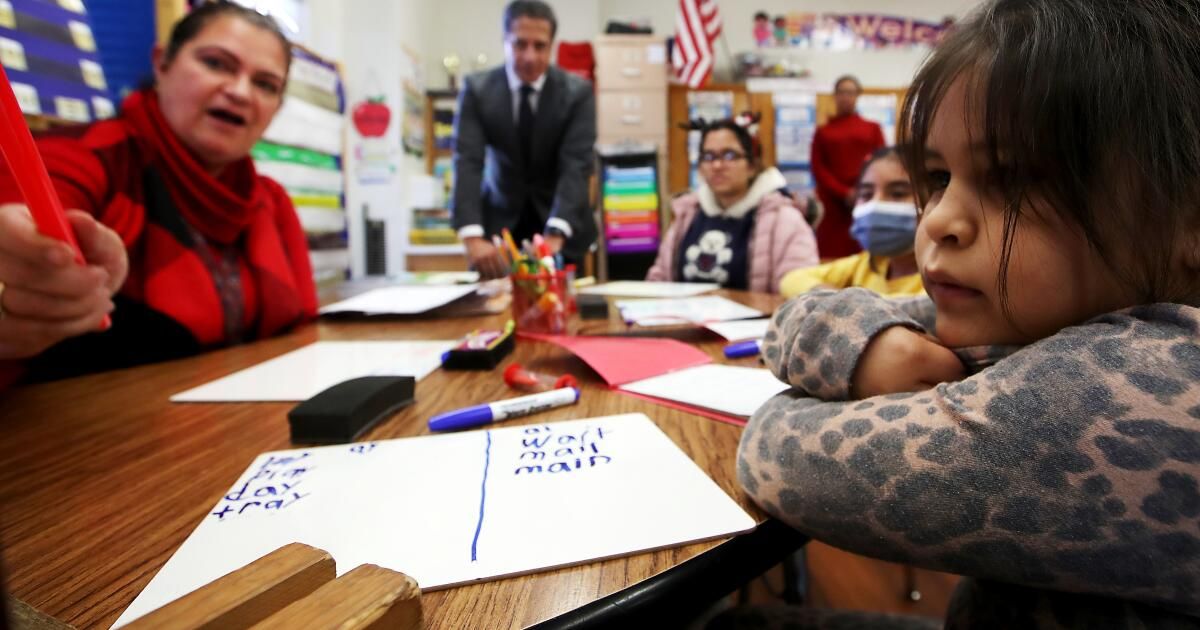A bill aims to improve lagging reading skills among California children by mandating how schools teach this critical subject. Another seeks to overhaul cafeteria meals by eliminating highly processed foods. A third aims to protect students from being derailed by discrimination.
These bills and others passed by the Legislature in the final busy days of the session will directly impact the classroom experience of some 5.8 million California public school students. Broadly speaking, these bills target the minds, health, and emotional well-being of students, and the results were not without controversy.
The measures now reach the desk of Governor Gavin Newsom, who has until October 12 to approve or reject them.
Assembly Bill 715: Anti-Discrimination
Among the most controversial education-related measures, Assembly Bill 715 arose from dissatisfaction (largely among a coalition of Jewish groups) with the way ethnic studies is taught in some California classrooms. Critics say that in some schools ethnic studies classes have unduly focused on the Israeli-Palestinian conflict and reflect prejudice against Jews. Accusations of bias are denied by those instructors who include the conflict in their syllabus.
The final version of the bill, along with Senate Bill 48, would broaden the focus beyond anti-Semitism, a revision that answers those who questioned why the bill's original language addressed only discrimination against Jews.
“California has taken a historic stance against anti-Semitism in our schools,” said David Bocarsly, executive director of the California Jewish Public Affairs Committee. “For too long, Jewish students have endured name-calling, bullying, and outright hostility in their classrooms with nowhere to turn. AB 715 is a promise to those students – and to all California children – that they are not invisible, that their safety and dignity matter.”
The legislation that ultimately emerged would create a state Office of Civil Rights that would report to the governor's cabinet. I would assume a monitoring and assistance mission, responding to complaints and questions; prepare learning materials and reports on how to identify and combat discrimination; and help teachers, schools, and school districts comply with state anti-discrimination laws.
A specialized coordinator would address different forms of discrimination: one for anti-Semitism, one for religious discrimination, one for racial and ethnic discrimination, one for gender discrimination, and one for LGBTQ+ discrimination.
Issues related to ethnic studies would include ensuring anti-discriminatory courses and teacher training materials. To investigate formal complaints, the state would rely on an existing complaint procedure, which examines alleged violations involving discrimination, harassment, intimidation and bullying.
Critics of AB 715, including the California Teachers Association. — acknowledge that the bill was revised to address their concerns, but still oppose it. They say it could chill discussion about controversial topics in ethnic studies and elsewhere and also falsely equate legitimate criticism of Israel with anti-Semitism.
AB 1454: Science of Reading
A sweeping bill would overhaul the way reading is taught in California classrooms, requiring phonics-based lessons and capping decades of debate over how best to teach children this critical skill. The bill is unusual in a state that generally emphasizes local control over instruction.
AB 1454 would require school districts to adopt educational materials based on what supporters call the “science of reading,” which is based on research on how young children learn to read.
The now-favored approach relies heavily on decoding and sounding out words based on letter sounds, while establishing five pillars for more effective instruction: phonemic awareness (the sounds letters make), phonics, reading fluency, vocabulary, and comprehension.
The hope is that this style of teaching will increase persistently disappointing test results.
A 2022 study of 300 California school districts found that fewer than 2% of districts used curricula that advocates considered sufficiently strong in the science of reading practices.
These advocates have long criticized alternative “whole language” approaches that rely heavily on the concept that children are more engaged when learning to read with less emphasis on decoding words. Instead, teachers focus on surrounding children with books to foster a love of reading, directing them to discover unfamiliar words based on context, pictures, and other clues.
“Transforming California's education system requires a coordinated approach based on proven solutions,” said Marshall Tuck, executive director of EdVoice, a nonprofit education advocacy organization that has advocated for change.
However, many California teachers remain committed to different methods and bristle at a state-mandated approach, especially one that flies in the face of their classroom experience and prior training. Advocates for English learners have expressed especially strong opposition to the philosophy of the science of reading.
AB 1264: Ultra-processed foods
Chicken nuggets, corn dogs, packaged frozen pizza, French fries, canned fruits and sugary cereals are the types of ultra-processed foods in school meals covered by Assembly Bill 1264, which would require healthier cafeteria options in the coming years.
Heavily processed foods often include reconstituted meat along with chemical additives such as preservatives, emulsifiers, colorings, and other ingredients that are not cooked from scratch, not to mention added sugars, fats, and salt, which together can harm “students' physical and mental health and interfere with their ability to learn,” according to the bill's author, Assemblyman Jesse Gabriel (D-Encino).
The bill was opposed by manufacturers, who considered it too restrictive and too subject to unscientific whims.
The final version alleviated some concerns by establishing a review process rather than simply listing foods and chemicals to ban. There is also a gradual introduction over several years.
The expectation is that the processed foods that remain on the menu will be healthier and also that efforts to prepare food in school kitchens will accelerate, relying as much as possible on local and fresh ingredients.
AB 564: Cannabis Tax and Child Care
The Legislature also voted to bring back a cannabis excise tax increase, which went into effect in July and raised the state tax rate paid by consumers to 19%. The goal is to bolster the troubled legal cannabis industry. Some child care funding is among the victims of lower tax revenues.
Assembly Bill 564 would mean an estimated annual reduction of $180 million for law enforcement, child care, at-risk youth services and environmental cleanup. Of the total, about $81 million would have financed subsidized childcare places for about 8,000 children from low-income families. Overall, the state budget to help with child care is $7 billion, a figure advocates say is insufficient for what is needed, especially with potential additional cuts looming.
Other notable measures
Senate Bill 848 attempts to protect children from sexual predators and also protect schools and school districts from liability related to sexual misconduct. The bill stems largely from expert recommendations developed in the wake of an earlier state law that provided victims of decades past an expanded opportunity to sue public entities.
A major feature of the bill would establish a tracking system so that low-profile employees, such as teacher aides, who leave their jobs due to alleged misconduct cannot seek the same position elsewhere without scrutiny.
Assembly Bill 461 would end the treatment of truancy as a crime under state law. Existing law may subject the parent or guardian of a student who is chronically absent or late to school to a fine of up to $2,000 and a prison sentence of up to one year.
Prosecutions are rare and potential sanctions are often considered deterrent. But the pendulum in California has swung from tough measures against truancy to alternatives like counseling and family assistance.
The Legislature has also passed bills supporting immigrant families, which will often have a residual effect on the operations of schools, such as a bill prohibiting immigration agents from accessing campuses unless they have a valid court order.
Times staff writer Daniel Miller contributed to this. report. Gold reports for The Times' early childhood education initiative, focusing on the learning and development of California children from birth to age 5. To learn more about the initiative and its philanthropic sponsors, visit latimes.com/earlyed.












